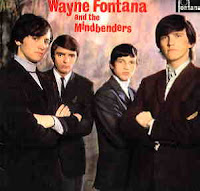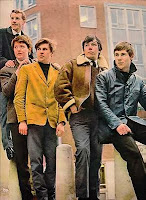 British Invasion: Part 8
British Invasion: Part 8
Formed in 1961 in a St. Albans' grammar school, the English rock band that probably sounded the most British among the "Invaders" was The Zombies. After The Beatles, this band's music has some of the most wonderful melodies of the era, using minor-key and jazz-influenced chord progressions with 3-part vocal harmonies. With Colin Blunstone's distinct, breathy lead vocals and the wizardry behind Rod Argent's keyboard skills, it's a shame these guys remain so under-rated. Okay, so maybe I'm a little partial. After winning a beat-group competition sponsored by the London Evening News, The Zombies were signed to the Decca record label and released their first single, "She's Not There," in July 1964. Written by Rod Argent, this song's most distinctive features include Argent's electric piano and the folk-influenced close-harmony style, and of course makes the list of the 500 Greatest Songs of All Time.
-----------------------------------------------------------------------------------------------
 Formed in 1962, The Hollies were a English pop and rock group from Manchester that we known for their distinct, bright vocal harmonies and chose their name in honor of Buddy Holly. Although they were one of the leading British groups in the 1960's and 70's, they were also one of the last major groups during the Invasion to have significant chart success in the US. Like The Rolling Stones and The Searchers, they're among the few British bands of the early 60's that never officially broke up and continue performing and recording today. Released in May 1967, "Carrie Anne" was among the group's many Top-Ten hits, written by the band members Graham Nash (who would later go on to form Crosby, Stills, & Nash), Allan Clarke, and Tony Hicks. Recorded in Abbey Road Studios and actually written about Marianne Faithfull (another British Invasion artist), this pop tune is just one of The Hollies' varied sound throughout their long-running music career.
Formed in 1962, The Hollies were a English pop and rock group from Manchester that we known for their distinct, bright vocal harmonies and chose their name in honor of Buddy Holly. Although they were one of the leading British groups in the 1960's and 70's, they were also one of the last major groups during the Invasion to have significant chart success in the US. Like The Rolling Stones and The Searchers, they're among the few British bands of the early 60's that never officially broke up and continue performing and recording today. Released in May 1967, "Carrie Anne" was among the group's many Top-Ten hits, written by the band members Graham Nash (who would later go on to form Crosby, Stills, & Nash), Allan Clarke, and Tony Hicks. Recorded in Abbey Road Studios and actually written about Marianne Faithfull (another British Invasion artist), this pop tune is just one of The Hollies' varied sound throughout their long-running music career.
-----------------------------------------------------------------------------------------------
 A band that's appeared a few times around here is the Small Faces, one of the most influential mod groups of the 1960's. Founded in East London in 1965, their music from the mid to late 60's remains among the most acclaimed British psychedelic/mod music of the era. Released in August 1967, the psychedelic pop song "Itchycoo Park" became one of the group's biggest hits. Written by the band's Steve Marriott and Ronnie Lane, 'itchycoo' was the nickname of the stinging nettles in the park they would play in as kids, however, a certain line about "getting high" caused a temporary ban by the BBC. This song was also the first to use the super-cool audio effect called flanging, the layering of the recording on itself at different speeds (listen at :49). Definitely another fun one by a creative group.
A band that's appeared a few times around here is the Small Faces, one of the most influential mod groups of the 1960's. Founded in East London in 1965, their music from the mid to late 60's remains among the most acclaimed British psychedelic/mod music of the era. Released in August 1967, the psychedelic pop song "Itchycoo Park" became one of the group's biggest hits. Written by the band's Steve Marriott and Ronnie Lane, 'itchycoo' was the nickname of the stinging nettles in the park they would play in as kids, however, a certain line about "getting high" caused a temporary ban by the BBC. This song was also the first to use the super-cool audio effect called flanging, the layering of the recording on itself at different speeds (listen at :49). Definitely another fun one by a creative group.------------------------------------------------------------------------------------------------
 Formed in 1964, one of the greatest rock bands of the 1960's (and beyond) was The Who, known for their energetic live performances and even instrument destruction. Initially influenced by American R&B and skiffle styles, the group was mainly fueled by guitarist Pete Townsend's creative force and songwriting, going on to sell over 100 million records and chart 47 Top-Forty singles in the UK and US. Released in December 1964 in the US (and January '65 in the UK), the rock/power pop song "I Can't Explain" was the group's first single and hit under the name The Who, a recording influenced by The Kinks' sound (who also shared the same American producer Shel Talmy) and another included in the 500 Greatest Songs of All Time. With Roger Daltrey's powerful voice, John Entwistle's aggressive sound on bass, and Keith Moon's forceful drumming, it's no wonder these guys have had continued success for decades, and this tune continues to be the group's staple at live performances today.
Formed in 1964, one of the greatest rock bands of the 1960's (and beyond) was The Who, known for their energetic live performances and even instrument destruction. Initially influenced by American R&B and skiffle styles, the group was mainly fueled by guitarist Pete Townsend's creative force and songwriting, going on to sell over 100 million records and chart 47 Top-Forty singles in the UK and US. Released in December 1964 in the US (and January '65 in the UK), the rock/power pop song "I Can't Explain" was the group's first single and hit under the name The Who, a recording influenced by The Kinks' sound (who also shared the same American producer Shel Talmy) and another included in the 500 Greatest Songs of All Time. With Roger Daltrey's powerful voice, John Entwistle's aggressive sound on bass, and Keith Moon's forceful drumming, it's no wonder these guys have had continued success for decades, and this tune continues to be the group's staple at live performances today.

































